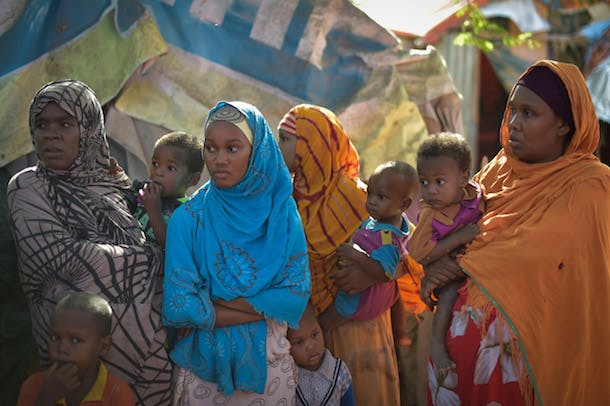
The scale of human suffering in the world today is unprecedented. Millions of people have been forced from their homes by violence and persecution; millions more are fleeing natural disasters, drought, and famine. The map is dotted with an ever-growing number of refugee camps, tent cities, temporary settlements, and emergency shelters, all of them full of people who are enduring the worst ordeal of their lives. Today, on World Refugee Day, we bear witness to their plight.
What does all this have to do with family planning? Everything.
One-fourth of all refugees, displaced persons, and disaster victims are women and girls of reproductive age. They need more than food, water, and shelter; they need the ability to determine whether or not they get pregnant.
For women living in refugee camps, an unintended pregnancy adds unimaginable complications to what is already a desperate situation. It’s also highly dangerous: The rate of women who die or suffer grave injury while giving birth in crisis settings is almost double the world average. In an environment of heightened sexual violence, risky childbirth, inadequate medical care, and uncertain futures, contraception is an essential lifesaving intervention.
That’s why one of the major themes of next month’s Family Planning Summit in London is reaching women and girls in humanitarian settings. This FP2020 Summit is being hosted by the UK Government, the UN Population Fund (UNFPA), and the Bill & Melinda Gates Foundation.
It’s a follow-up to the 2012 London Summit on Family Planning and is designed to revitalize global commitment to women and girls and their right to contraception.
Of the 225 million women worldwide with an unmet need for family planning, a significant number are in refugee camps, conflict areas, or disaster zones. Bringing the humanitarian and development communities together in new ways is critical to meet this challenge – especially now, at a time when the political support and financial resources for global aid are threatened.
A key goal of the summit is to ensure that family planning is prioritized among other humanitarian interventions. Despite myths to the contrary, demand for contraception in crisis settings is high: Women and couples who are displaced frequently say that they wish to prevent pregnancy. And when contraceptives are made available, the rate of uptake is brisk. Just like food, water, and shelter, contraception must be part of the minimum humanitarian response.
One of the things we’ll be talking about is how to expand on the variety of contraceptive methods that are available in humanitarian settings. Pills and condoms aren’t enough; women need a range of options to find the method that works for them. Long-acting reversible contraceptives (LARCs), such as IUDs and implants, are an important part of the mix. LARCs are 20 times more effective than contraceptive pills and can be provided even in the immediate postpartum period – no waiting necessary.
Another priority is ensuring access to emergency contraception from the outset of a crisis. Emergency contraception is essential in light of the high rates of sexual violence in crisis settings; it also provides a fail-safe when other forms of contraception are unavailable. Having it pre-positioned so that it’s available for women who are fleeing violence – and there for women facing life in a temporary camp – will bridge a huge gap.
Integrating family planning with humanitarian aid also makes sense from a development perspective. The working environment in many countries is complex, with a combination of urgent humanitarian needs and ongoing development challenges. But thoughtful, strategic partnerships across sectors can go a long way. A crisis situation can be a chance to reach remote or marginalized populations with family planning services for the first time, thus laying the groundwork for more comprehensive reproductive health services once the crisis is past.
Strategic investments in key elements of the health infrastructure can serve multiple purposes: delivering critical services in the near term, shoring up resilience for future crises, and helping countries achieve their long-range development objectives.
All this and more will be on the agenda at the Summit. Our goal is to emerge with a strong slate of concrete commitments. First and foremost is a commitment to include family planning as a core service during all phases of a humanitarian crisis. We’ll also be taking steps to mobilize more funding for family planning in humanitarian settings and to establish an agreed-upon data-gathering and monitoring framework.
None of this will be easy, but it’s absolutely necessary. The humanitarian crisis is one of the greatest challenges we face as a global community. Millions of women and girls are vulnerable, far from home, and in desperate need of aid. It’s up to us – all of us – to make sure they get it.
[Photo: UN Photo/Tobin Jones]



 View All Blog Posts
View All Blog Posts